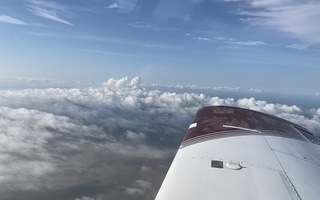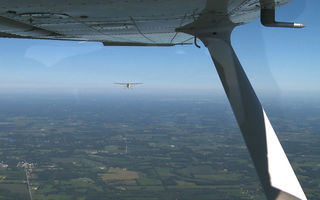Well, the very short answer is yes. Yes 1,000 times.
Becoming a pilot is the most fun, insightful journey and deciding to extend that to making it a career makes that the journey of a lifetime (see what I did there ;) ).
But the harsh truth is not everyone is meant to be a pilot. Flight training isn't easy and can become very time consuming. Those who make it through have to be dedicated, motivated and self-disciplined. Even then, someone can have all the dedication it takes and just not have the skills needed to safely fly an aircraft. These skills are partly developed over time and partly come from the abilities you carry as a person. Let's talk about them:
Being a safe pilot means you have to be able to handle multiple things at once. Takeoff is a perfect example, especially on an IFR flight when you're single-pilot. Power settings are in, gear comes up, you're having to monitor all the engine instruments have good readings, ATC comes in with new instructions that you have to repeat back and then comply with, and throughout all this you're still having to fly the plane and be ready for any emergency. Imagine doing this in a jet...all that happens in about less than 20 seconds.
Even as a VFR only pilot in a small fixed-gear plane it's still busy. During the takeoff you're ready to abort it or do an emergency landing at any time, respond back to ATC and comply, then don't forget after takeoff checklists. This sounds simple but in the air it can be a lot to handle. I find students struggle the most with remembering their after takeoff checklist and on a cross country keeping up with their checkpoints as soon as we're off the ground. It's like as soon as you rotate, everything is forgotten and you get tunnel vision.
With everything I just described on multi tasking, this doesn't come without a drop of sweat or two. As you're keeping up with all of your tasks you can feel the pressure sitting on your shoulders to get everything done and keep flying the plane safely. During flight training, you'll feel the pressure of your instructor sitting next to you watching everything you do and being ready to point out the first mistake you make (it's literally our job, that's how you learn!). You can have an instructor who points them out nicely, or not so nice one.....but at some point you have to learn to be able to do it all yourself. The same pressure is there when you carry passengers. They may not know as much of what's going on as your instructor did, but sometimes you can still feel them watching and listening to everything you do. They don't know how to fly, so they're relying on you to get them somewhere safely!
Now imagine if an emergency occurs, the pressure is REALLY on there. This isn't being said to scare you, but a good pilot always expects the unexpected and handles it without panic. They go through their checklists with ease, keep everyone onboard calm and then neutralize the situation as much as possible in order to land safely. Remember that story about Captain Tammie Jo Shults who lost an engine on a Southwest flight? Here is the article link of her story and an attached audio link. Listen to how calm her voice is. If she didn't say there was an emergency, you would've never guessed what had been going on.
This one is most important when it comes to flight training. I see time and time again students who come in and say "I want to be a pilot" and then 6 months later they have like 2 flight lessons under their belt. Let's be honest, flight lessons aren't cheap. If you're going to pay out of pocket try and save up a lot first and apply for as many scholarships as possible, this way you don't have to slow down training and only be able to pay for one lesson at a time. Second is when you have the finances available, schedule flight lessons for at least several times a week and show up to each one prepared! It will do you no good to rarely fly (like once a month for example) and to never study. Don't show up to each lesson and depend on your instructor to teach you everything. Teach yourself as much as you can at home and let them fill in the gaps. This helps you progress much faster and also save money if finances are tight.
Being able to multi task, work under pressure, be motivated and be self-disciplined are some of the most important factors that create a good pilot. Of course there's a few others that could fall into desired aspects, but without these you'll never "lift off the ground."
Think you meet these though and want to become a pilot? Go for it and don't let anything stop you.





